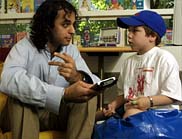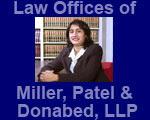Contribute
| Lokvani Talks To TR 100 winner Vikram Sheel Kumar |
Ranjani Saigal
10/19/2004
Dr. Vikram Sheel Kumar, President and CEO of DIMAGI Inc, joined the
select group of TR100 winners and won the “Technology in the Service of
Humanity” award for Dimagi's work in developing interactive systems
that motivate health workers and patients to care for and manage
chronic diseases. Kumar, 28 is from New
Delhi, India. He did his undergraduate studies from Columbia University
in New York and received an MD, Ph.D. from the Harvard-MIT Division of
Health Sciences and Technology, Kumar spoke to Lokvani about his work and his interest in improving Health Care management around the globe. Congratulations on becoming part of the this select TR100 club. What does this award mean to you? It
is very interesting to note that you have received the “Technology in
the Service of Humanity” award. Why did you decide to develop
technologies to help the rural communities in India? Once
the data is collected on these handheld devices, what happens to the
data? Is network access available in the rural communities to send
the data to central servers? You
grew up in India. If you wanted to be a doctor why did you not get
admission to a medical school right after your high school instead of
trying to get a degree in engineering first? More
recently you have been working in South Africa to address AIDS. You
created HIV Confidant to help solve the problem. Can you describe what
the HIV Confidant does ? Based on your experiences in various parts of the world, what worries you the most about public health? You
have been working to impact people’s lives rather than working on
making money. The skills you posses can help you make a lot of money.
Are you not interested in that goal? Who are the people that can claim to have a great influence on your life? What are your goals for the future?
His innovative technologies include:
•
Ca:sh, a mobile electronic medical record (EMR) system designed to be
used by outreach workers in large communities to address the problems
of poor data flow and logistical support for rural paramedical workers,
such as those in the State of Haryana, India. Dimagi, In operation
since February 2002.
• DiaBetNet™, an integrated software system
designed for the millions of children all over the world suffering from
juvenile type I diabetes. DiaBetNet helps children monitor their
diabetic status and teaches them about controlling a disease that most
will have to live with throughout their lives. Intuitive games
encourage children to measure and predict their sugar levels, while
wireless technology transmits readings to a central database accessible
to the children's doctors. In addition to facilitating the transfer of
data from a patient to a centralized server, DiaBetNet builds a
valuable support community for the patient.
• HIV Confidant, a
system that uses handheld computers to confidentially distribute HIV
results in a surveillance project at the Africa Centre for Health and
Population Studies in northern KwaZulu-Natal, South Africa. The system
combines the advantages of linked anonymous HIV surveillance with the
opportunity to offer patents counseling on their status without having
to have a second blood sample taken.
I
am honored by this recognition. It shows me that the problems we are
working on are important. I also hope the award will spark an the
interest in others that may bring more resources to these problems.
At the Media Lab, when we develop cutting edge technologies we are always interested
in applying those technologies to real world situations. We had some
development that we had done with handheld devices. As we looked around
for interesting applications of our technology we identified a need
that paramedical workers in India who work in rural communities face.
They were using paper to track data and had no continuity of care
through the data.
In association with Media Lab Asia and the
All India Institute of Medical Sciences, we were able to use our work
to develop a handheld software application to facilitate ordered data
collection, immunization scheduling, pre-natal care for pregnant
mothers and recording routine demographic changes in the community.
This helps paramedical workers, who no longer need to spend long hours
manually transferring data from one ledger to the next. Also the health
workers are able to access data and benefit from the point of care
decision support provided by the application. The system currently
records and manages data from over 70,000 patients.
We are so pleased that it can really help make a change.
One of the biggest misconceptions that we found in this field is that one needs complicated systems for data transfer. As an alternative, a hybrid system such as a sneaker-net may be more appropriate. Courier services already have an excellent network that reaches far and wide. So if we could collect data on smart cards we can just physically mail them back to people who have network access and they can transfer the data quickly and efficiently. In some sense I think we need to rethink how we should address the need of rural communities without waiting for broadband connection which costs a lot of money.
As a child, I was always fascinated by technology. When I was in high school, my father and I invented a modified fax machine. I was not ready to get focused on medicine right after high school. My engineering training gave me an excellent approach to problem solving. Studying medicine helped me identify problems that need solutions.
An important issue faced by health workers and patients in South Africa is the concern of patient confidentiality. People are scared to come to clinicians because they worry that their clinical records may be known to public and there may be a stigma attached to them. HIV confidant is a smart card system through which test results are shared with the patient. The information needs two keys for authentication, one which is known to the clinician and the other that is known only to the patient. Thus the record can be accessed only when both the clinician and the patient jointly authenticate the use of the record. This gives patients the assurance that their record is safe which then encourages them to use the services of the clinic to get tested.
It really worries me to see so many sections of the population dying with diseases that we have known cure for, which can be controlled only if the information could be put in the right hands. I am very concerned about AIDS in India as I think India is in denial about the problem.
I think one can and will make money if one does anything well and for a long enough period of time. I think I am probably no exception to that rule. Using technology to impact a million lives is a wonderful thing for me and I am glad that with the help of my co-founders Dr. Vishwanath Anantraman and Tarjei Mikkelsen, Dimagi is working towards this.
My father, who is a neurosurgeon in Delhi has been a guiding force in my life. He
always motivated me . My uncle Prof. Yashpal, former Chair of the
University Grants Commission who has done wonderful things to make a
difference in India has been an inspirtation for the entire family. My mother was always there to support me.
At the media lab, Prof. Alex Pentland has been a great mentor and friend.
I
am very interested in Chronic Disease management. Heart disease kills
so many Indians. We hope we can understand it better and learn to
manage it.
You may also access this article through our web-site http://www.lokvani.com/

